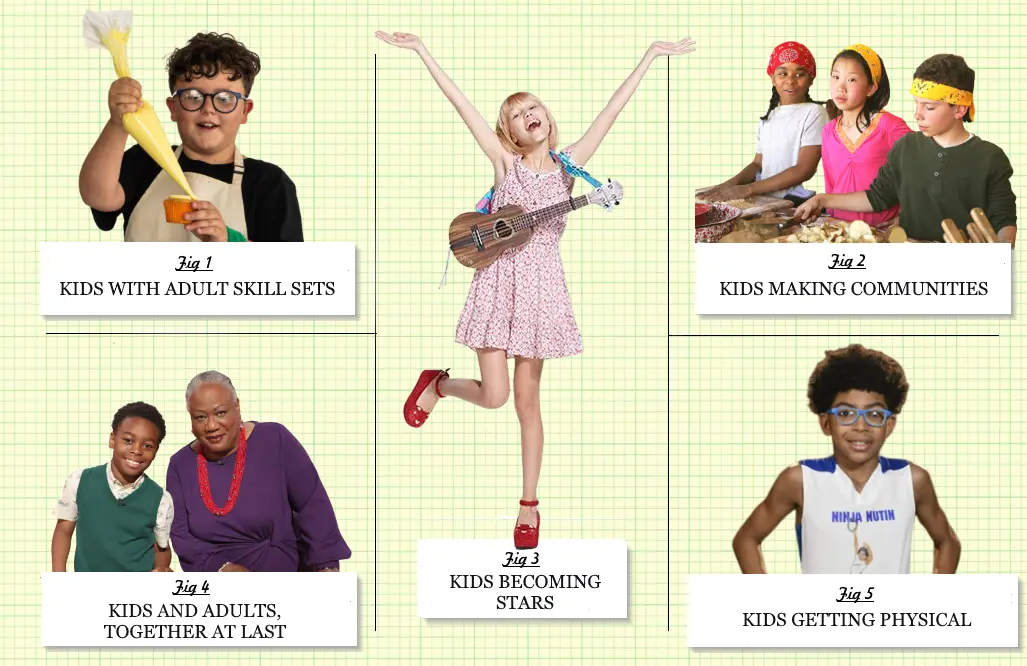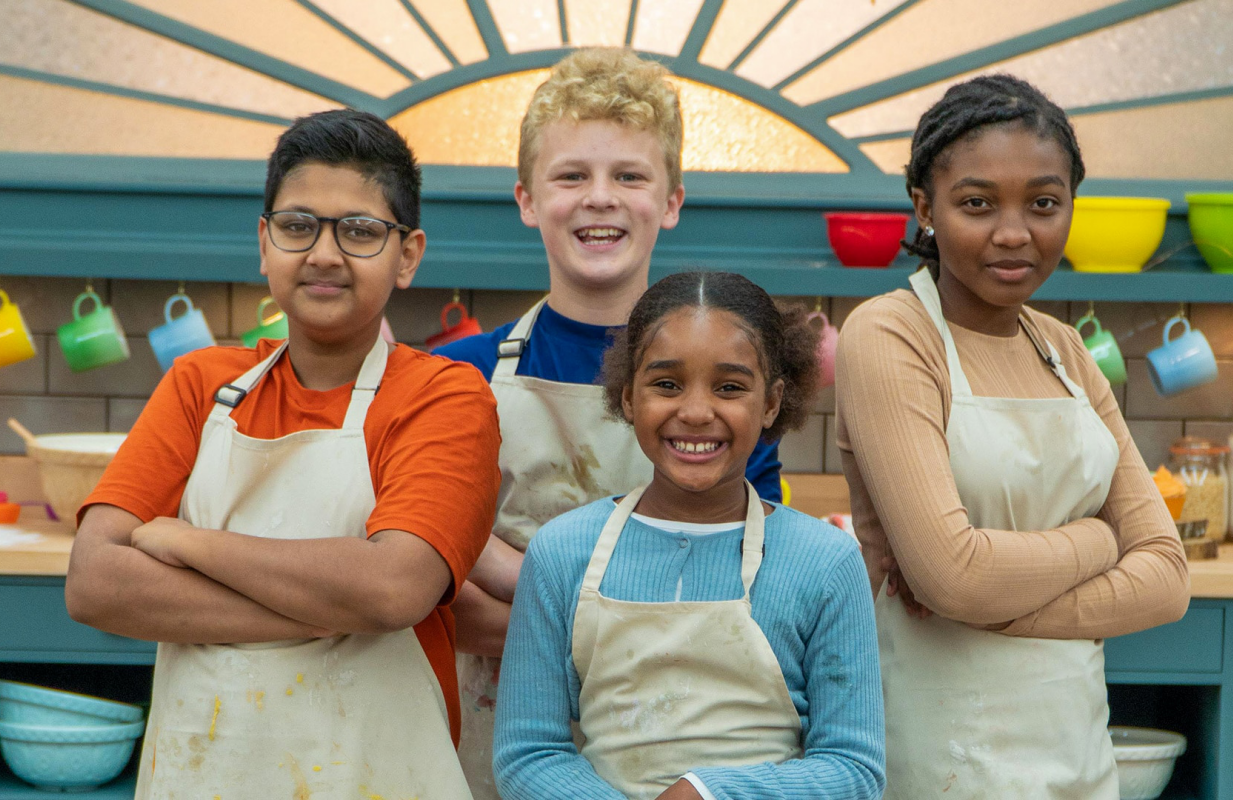A Taxonomy of Kid Reality Competitions
-
 Photos: Channel 4, ABC, NBC, CBS, Peacock.
Photos: Channel 4, ABC, NBC, CBS, Peacock.We knew this day would come: On August 17, Netflix is finally letting American viewers see Junior Baking Show, the kids-only spin-off of The Great British Baking Show that's been airing in its native UK since 2011. This was inevitable not only because the rules of brand expansion require an endless stream of Baking Show product, but also because reality competitions for children are a thriving industry.
That's not to say they're all the same. From their formats to their intended audiences, kiddie reality competitions come in as many varieties as their adult counterparts. To help make sense of it all, we've broken out the five most common types of reality competitions that put young people in the hot seat.
Kids With Adult Skill Sets

We don't usually expect a 12 year-old to make a delicious seafood bisque or a high schooler to sew a runway-ready gown, so when young people excel in these adult pursuits, it often makes for good TV. For underage viewers, it can be empowering to see a peer prove that mature excellence is within reach, and for grown-ups, it's charming and sometimes even moving to see stressful industries approached with fresh-faced enthusiasm. This is where Junior Baking Show comes in, along with other cooking competition spin-offs like Chopped Junior and Top Chef Junior. (And we can't forget The Food Network's wildly successful Kids Baking Championship, which just completed its 10th season this year.) Project Runway Junior held on for two seasons, but by and large, it's the cooking shows in this category that really seem to resonate.
Kids And Adults, Together At Last
The generation gap is always good for a narrative hook, and a good number of reality competitions have used it to their advantage. Sometimes kids and adults are teamed up to cooperate, whether it's on this summer's Kelly Ripa-hosted Generation Gap or family versions of The Amazing Race and Double Dare. These shows have inherently warm messages about teamwork and family bonding, and they frequently encourage adults to be silly, which is always a bonus.
Sometimes these shows pit kids and adults against each other. On ABC's The Toy Box, toymakers brought their inventions before a panel of elementary-aged judges and hoped for the best. On Are You Smarter Than a Fifth Grader?, adults tried to outwit children in trivia challenges, and on Disney+'s The Big Fib, youngsters tried to determine which grown-ups were lying to them. Even though this type of show is occasionally marketed to adults, it's ultimately for young viewers, since it enacts every kid's fantasy of having more power than the adults who tell them what to do.
Kids Getting Physical
Nickelodeon is the great originator of this subsection. Game shows like Double Dare, Finders Keepers, and Legends of the Hidden Temple all gave their young contestants a chance to climb on stuff, make messes, and basically run amok on giant playgrounds. The fact that there were prizes at the end hardly mattered: The point was getting to strap on some goggles and go down the sundae slide. There's a similar appeal in "adult playground" shows like American Gladiators and American Ninja Warrior, and it's no surprise that we've now got American Ninja Warrior Junior, which moved to Peacock last year.
Kids Making Communities
When a group of kids face a challenge, the result won't necessarily be like Lord of the Flies, although that was the implied promise of Kid Nation. That CBS series, in which 40 minors were dropped into an abandoned town and asked to form a society, only ran for a season in 2007, but it's since become a cult hit on YouTube. It's also a spiritual ancestor to other series that ask youngsters to solve problems as a team, although the newer shows don't have the same apocalyptic undertones. Disney+ is cornering the market on this format right now, thanks to series like Shop Class (teens inventing things together) and The Quest (teens participating in a real-life role-playing fantasy game). But no matter their tone, the common denominator among these programs is that adults are almost entirely absent. What's the fun in building a new society if grown ups get to be there?
Kids Becoming Stars
All of the above formats have a certain element of fame-chasing, but ever since Mr. Mozart dragged little Wolfgang around to play the piano in fancy ballrooms, we've been especially fascinated with children who can sing, dance, and otherwise perform for our amusement. Reality competition series have exploited this from the very beginning: Star Search featured junior vocalists in the 80s, and American Idol had barely begun when American Juniors was launhced to let pre-teens warble power balllads for public votes. Dancing With the Stars also had a juniors-only version, while shows like America's Got Talent just fold kid acts into their regular mix. It seems certain that even if television itself evaporates and the internet goes down forever, we'll always find a way to get mama's little sweetheart to strap on some tap shoes and entertain the people.
Junior Baking Show premieres August 17 on Netflix.
Mark Blankenship has been writing about arts and culture for twenty years, with bylines in The New York Times, Variety, Vulture, Fortune, and many others. You can hear him on the pop music podcast Mark and Sarah Talk About Songs.
TOPICS: Junior Baking Show, The Amazing Race, American Ninja Warrior Junior, Are You Smarter Than a 5th Grader?, Chopped Junior, Dancing with the Stars: Juniors, Double Dare, Generation Gap, The Quest, Top Chef Junior